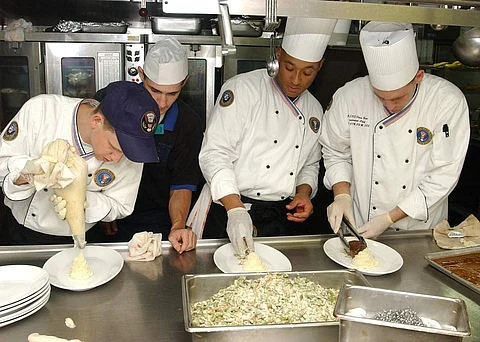

In India the nationwide lockdown came as a sudden and disruptive undertaking especially to the educational institutions. Overnight, institutions were required to transfer their curriculum to online mediums.
As traditional institutes shut down immediately, institutions providing culinary courses found it a challenge to take their curriculum online. Culinary schools had to cope with moving cooking classes, tactile in nature to a virtual setting, vacating their teaching kitchens and on campus restaurants. Did this mean that culinary educators and students would be stuck in a limbo until campuses reopen?
Culinary Curriculum
The culinary arts curriculum is designed around hands-on instruction conducted in a kitchen-classroom setting ensuring the students learn the art of cooking under professionals with state-of-the-art equipment. The educators examine the work put in by the students and then provide necessary instructions and feedback. As this exact method cannot be replicated in the virtual environment due to physical constraints, the only way forward is innovating and adapting.
These culinary institutes have infrastructure and are well-equipped with the precise and specific set-ups unable to be replicated at home. To create a visual image, a typical class day for a student in culinary arts would revolve around using state of the art equipment, processors and working with rare and hard to find ingredients. The purpose of this is to familiarize them with the advance tools used in any top-notch functional kitchens. A regular household cannot be expected to be equipped with these tools, especially due to the current situation they cannot step out to source the same.
Practices adapted owing to the current situation
Adapting to the current situations, we can observe that culinary institutions are re-inventing and adjusting with what is available at home. They have tried to adopt new methods so that the students do not suffer and stay on the right track with the courses. With these virtual classes the instructor can be seen demonstrating the methods of braising, cutting, sautéing, chopping and dicing and the students are expected to follow. What might be lacking here is the in-person analysing and feedback, however these can still be shared online verbally. A basic recipe is given to students beforehand, and they prepare the dish alongside the instructor. As there’s no guarantee that students have advanced equipment at home, many curriculums now focus on strengthening foundational basics and working on problem areas.
These online lessons not only help keep students on track of the curriculum, but are a way of keeping the students motivated. It’s a place where everyone involved can get together to connect and share. These online sessions also aim to achieve a sense of community and create a space for students to connect- something that is crucial in today’s socially distanced scenario. Nowadays, institutes are also using this opportunity to conduct virtual sessions with industry leaders and prominent professionals by organizing engaging interactive sessions for the students. Regular appearances from celebrity chefs help keep students excited, engaged and motivated to keep learning and look forward to campuses reopening.
It’s about adapting as best as we can before things can go back to normal
At the end of the day, the current teaching methodologies for all practically inclined courses are far from ideal or perfect. While classes might not be happening the way institutes would ideally want to, students are still kept engaged, they’re still learning something new everyday. This lockdown period is a great time for culinary students to focus more on learning more about theory, catching up on recipes and reading up on basics and foundations – all which just as crucial and important as chopping and stirring in the kitchen.
The time spent away from the kitchen this year can be easily compensated once campuses reopen, with many colleges most probably offering supplementary classes to bring students back up to speed.
Dilip Puri is the Founder and CEO of Indian School of Hospitality. Views are the authors own
